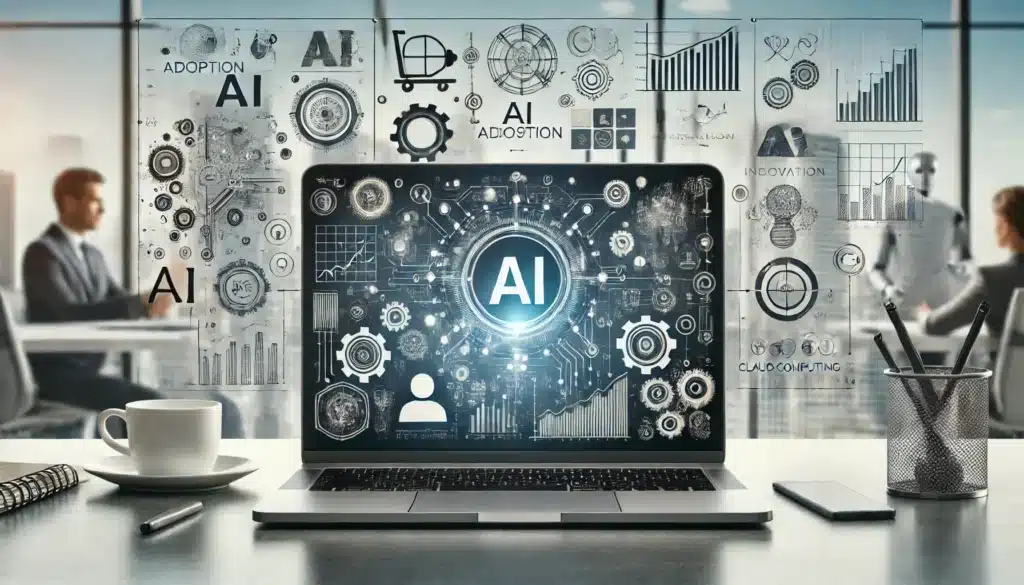Artificial Intelligence (AI) has emerged as a pivotal technology in today’s digital landscape, revolutionizing how businesses operate and make decisions. Despite its transformative potential, the adoption of AI is influenced by numerous factors that shape its implementation within organizations. This blog explores these factors and delves into the inhibitions surrounding AI adoption.
Increasing importance of AI in business
AI technologies are increasingly becoming integrated across various industries, automating tasks, increasing productivity, and enabling data-driven decision-making. Predictive analytics, natural language processing, and other capabilities make traditional workflows transform into completely new ones. But along with its adoption, it is not without roadblocks. Understanding these is critical for businesses to get the most out of their use of AI.
Benefits of AI Adoption Efficiency Gains:
- Automation of repetitive tasks saves time and reduces errors.
- Improved Decision-Making: data analysis capabilities enable informed and strategic decisions.
- Saving through process optimization that results in minimized operational cost.
- Customer Insights: AI provides insights into customer behavior and preferences
- Innovation: AI solutions will give more innovative business processes
Key Factors Influencing AI Integration
Efficiency of Algorithms
One key factor influencing AI adoption is the efficiency of algorithms powering AI systems. The ability of these algorithms to analyze vast amounts of data and provide valuable insights is crucial in driving the adoption of AI within organizations.
Interactive Exercise: Try a live demo of a data analysis tool to see how algorithms can transform raw data into actionable insights.
Organizational Structure
The organizational structure plays a significant role in determining how seamlessly AI can be integrated into existing processes. A flexible and adaptive organizational structure is more likely to successfully adopt AI technologies.
Interactive Poll: How adaptable do you think your organization is in integrating new technologies?
Ease of Use
The ease of use of AI applications plays a pivotal role in encouraging their adoption among users at different levels within an organization.
Interactive Quiz: Rate the user-friendliness of the AI tools you have encountered.
Training and Support
It becomes much easier to ensure that AI tools are being used effectively if employees are given training.
Strategic Vision
Organizations clearly, and strategically reap success when implementing AI. Goal-based definitions and timely alignment of AI initiatives with business objectives play a key role.

Industry Applications of AI
Healthcare: AI enhances diagnosis and tailors the treatment plan, making paperwork easier.
Retail: Predictive Analytics Efficient management of inventories and customer experience.
Finance: AI-driven fraud detection algorithms and investment strategy automation.
Manufacturing: Predictive maintenance and robotic process automation improves efficiency.
Impact of AI on Decision-Making Processes
Speed and Efficiency
The adoption of AI technology profoundly impacts decision-making processes within organizations. AI systems can significantly influence the speed at which decisions are made by automating repetitive tasks and providing real-time insights.
Case Study: Explore a scenario where AI reduced decision-making time from days to minutes.
Accuracy
AI technology enhances the accuracy of decision-making by leveraging advanced algorithms to analyze complex data sets.
Interactive Infographic: Compare traditional decision-making processes with AI-enhanced decision-making.
Integration Challenges
The successful integration of AI technologies into existing systems is vital to ensure that decision-making processes are streamlined and efficient.
Video Tutorial: Watch a guide on best practices for integrating AI into your business processes.
Main Barriers to the Adoption of AI
Security and Privacy Concerns
- The benefits of AI notwithstanding, security and privacy are significant obstacles to the widespread use of AI systems. The reason for it, therefore, lies in providing means for ensuring AI is secured and respects privacy.
Discussion Forum: Share your thoughts on how to address security concerns in AI adoption.
Lack of Understanding
- A lack of understanding of AI capabilities often leads to hesitancy in adopting AI technologies.
Webinar: Attend a session on demystifying AI for business leaders.
Resistance to Change
- Resistance to change within organizations poses a significant barrier to the successful adoption of AI technologies.
Interactive Workshop: Learn strategies to overcome resistance to technological change within your team.
Fear of Job Displacement
Probably, it’s the most frequent problem concerning AI: replacing a human’s job. The related fear may lead to employees’ resistance, as well as to their employers’ hesitation to collaborate. At the same time, AI creates new opportunities for people to reskill and upskill, opening up various new roles and career paths.
Cost of Implementation
It has major up-front investments for any organization in tools, infrastructures, and training acquisition. Yet, more cloud-based AI solutions present the opportunity for even tiny businesses to access it.
The Role of AI Tools in Facilitating AI Adoption
Enhancing Adoption
- AI tools play a crucial role in facilitating the adoption of artificial intelligence within organizations. The effectiveness of AI tools in enhancing the adoption of AI technologies cannot be overstated.
Interactive Tool: Try out an AI-powered project management software and see its impact.
Integration Challenges
- Organizations often face challenges in integrating these tools with existing systems, hindering the seamless implementation of AI solutions.
Case Study: Read about a company’s journey to successfully integrating AI tools into their legacy systems.
Training and Upskilling
- Training and upskilling requirements are essential for users to leverage AI tools effectively and maximize their potential benefits.
Interactive Course: Enroll in an online course to get certified in AI tool usage.
Enhanced Accuracy
- AI systems further the accuracy of decisions because of analyzing complex data, eliminating errors and biases. For instance, AI applications in the financial sector can predict market fluctuations with all-around precision.
Strategies to Overcome Barriers
- Awareness Building: Educating employees and other stakeholders about AI’s potential benefits and answering their concerns can also be very positive.
- Investment in training and up-skilling: The training of employees to use AI tools effectively ensures a smooth transition and a high return on investment.
- Interactive Course: Registration for certification of an online course on the usage of AI tools.
- Ethical Standard Setting: Having ethically developed and adhered to AI tools can help to instill further belief and reduce apprehensions, especially about fairness and transparency.
Future Directions for Research on AI Adoption
AI in Emerging Economies
- Future research in AI adoption focuses on exploring new avenues to promote the widespread adoption of AI technologies. Research endeavors include investigating AI adoption in emerging economies to understand the unique challenges and opportunities present in these contexts.
Interactive Map: Explore AI adoption rates across different countries and regions.
Structural Equation Modeling
- The utilization of structural equation modeling in adoption studies provides valuable insights into the antecedents that influence adoption intentions.
Interactive Model: Experiment with a structural equation model to see how different factors affect AI adoption.
Impact on Technology Acceptance Models
- Research efforts are directed toward examining the impact of AI adoption on technology acceptance models to enhance our understanding of the factors that drive the acceptance and use of AI technologies.
Research Paper: Read the latest findings on AI adoption and technology acceptance models.
Role of AI in Sustainability
Exploring how AI can contribute to sustainability efforts, such as energy efficiency and waste reduction, offers promising avenues for future research.
Conclusion
Understanding the inhibitions and factors influencing AI adoption is crucial for organizations looking to leverage this transformative technology. By addressing concerns, fostering a culture of adaptability, and providing adequate training, businesses can successfully integrate AI into their operations, paving the way for innovation and growth.
FAQs
1. What are the key drivers of AI adoption?
Key drivers for AI technology adoption in organizations include the efficiency of algorithms, organizational structure, and ease of use.
2. How does AI adoption impact decision-making?
AI adoption improves decision-making through speed, accuracy, and efficiency in processes. Businesses make data-driven decisions faster.
3. What are the key challenges of adopting AI technologies?
Some of the major barriers that organizations face while adopting AI include security concerns, lack of understanding, and resistance to change.
Join the Conversation: What are your experiences with AI adoption in your organization? Share your insights and questions in the comments below.



